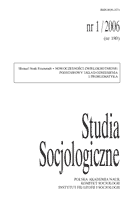Nowoczesności zwielokrotnione: podstawowy układ odniesienia i problematyka
Multiple modernities: the basic framework and problematic modernity
Author(s): Shmuel N. EisenstadtSubject(s): Social Sciences
Published by: Instytut Filozofii i Socjologii Polskiej Akademii Nauk
Keywords: programmes of modernity; multiple modernities; modernization theories; civilizations; human creativity; constitution of society; social order
Summary/Abstract: Recent events and developments — especially the continual processes of globalization, the downfall of the Soviet regime and the end of the cold war and later on September 11, 2001 — have sharpened the problem of the nature of the modern, contemporary world. The continually increasing processes of globalization in the contemporary world pose even more radical questions – namely as to whether the end of the twentieth century signals an end of modernity, of the modern project as it has developed for the last two centuries. The destructive tendencies were intensified with the expansion of modern civilizations beyond the West, first beyond Europe to the Americas, and then to Asia and Africa. The different programs of modernity were shaped especially by the combination of the basic visions inherent in the program of modernity and the concrete institutional developments in different modern societies. The emerging paradigm of multiple modernities provides an agenda for the analysis – but ultimately also for the peaceful coexistence – of these differences in an age of common global conditions and of shifts in the contours of the international system that, in contradistinction to the assumptions of classical modernization theory, are not transient but profound and interpretable only with recourse to the best that historical scholarship and theoretical sociology has to offer.
Journal: Studia Socjologiczne
- Issue Year: 180/2006
- Issue No: 1
- Page Range: 27-59
- Page Count: 32
- Language: Polish

